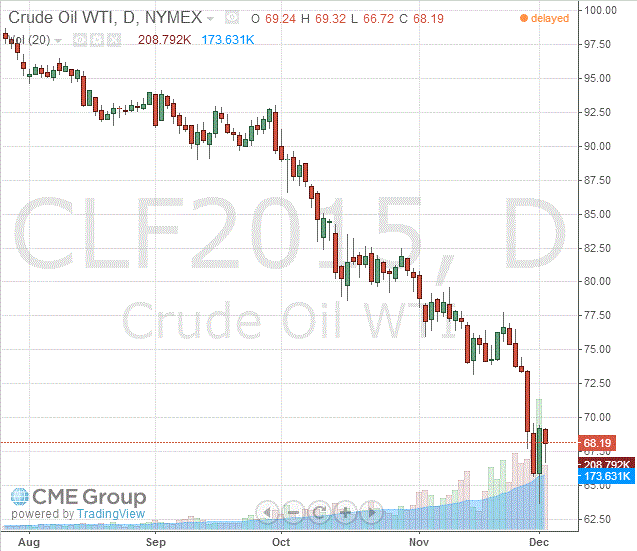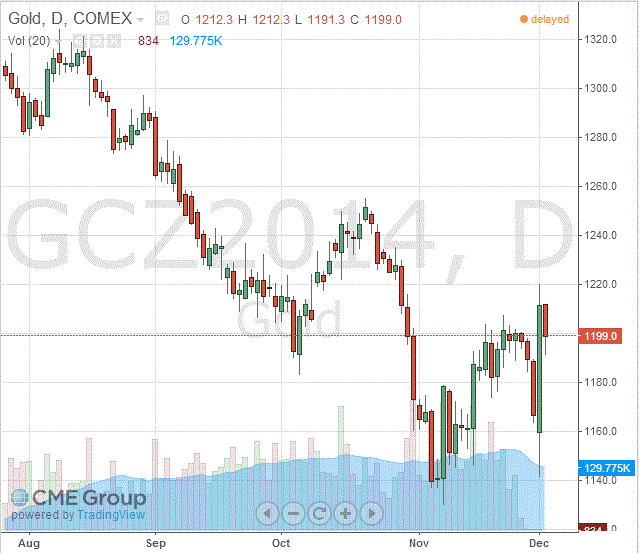Notícias do Mercado
-
23:35
Commodities. Daily history for Dec 2’2014:
(raw materials / closing price /% change)
Light Crude 67.65 +1.15%
Gold 1,197.50 -0.16%
-
16:45
Oil: A review of the market situation
The cost of oil futures fell today as investors continue to win back OPEC's decision to maintain production at current levels.
Recall on November 27 in Vienna held a summit of the Organization of Petroleum Exporting Countries. The cartel decided to maintain the current oil production of 30 million barrels per day until June 2015, prompting markets to continue to reduce prices.
The course of today's trading was also influenced words of the head of the International Monetary Fund Christine Lagarde. She stated that the fall in world oil prices in general have a positive impact on the world economy. According to her, falling oil prices could add 0.8% GDP growth developed economies of the world "as they are all importers of oil, regardless of whether one is talking about the United States, Japan, Europe or China."
Meanwhile, the head of the International Energy Agency, Maria van der Hoeven said the fall in prices a serious challenge especially for companies that extract oil from unconventional sources. For example, the rapid growth of shale oil in the US, probably began to slow: according to Reuters, last month, the number of issued permits in the United States to drill new wells in shale deposits decreased by 15% compared with the previous month, according to the reduction in the number of permits issued on drilling in October.
Prices also affect expectations of fresh release weekly data on oil and petroleum products in the United States to gauge the strength of demand from the world's biggest consumer. It is expected that oil stocks rose 0.9 million barrels for the week ended November 28
Cost of January futures for US light crude oil WTI (Light Sweet Crude Oil) dropped to 68.19 dollars per barrel on the New York Mercantile Exchange.
January futures price for North Sea Brent crude oil mix fell $ 0.81, to $ 71.44 a barrel on the London Stock Exchange ICE Futures Europe.
-
16:20
Gold: A review of the market situation
Gold prices declined moderately today, dropping at the same time below $ 1,200 per ounce, which was due to the appreciation of the US currency.
The dollar rose 0.7 percent against a basket of major currencies, supported by comments from Fed Chairman Vice Stanley Fischer and the Federal Reserve Bank of New York, William Dudley. Both said that lower oil prices are generally very favorable for US economic growth. Dudley also said that the US central bank is likely to carry out first rate hike next summer. In his speech, he explained that the pace of interest rate hikes will be equally determined by the situation in the economy and how the financial conditions will respond to changes in the Fed's policy
Experts note that the prices of precious metals are likely to remain reduced and tend to decline further in the near term amid signs of strengthening US economy, which could cause the Fed to raise interest rates sooner and faster than previously predicted. Expectations of growth rates on loans put pressure on gold as a precious metal with difficulty competing with the yield of interest-earning assets at higher rates.
"The market has been too much short positions, but the growth seems excessive. I think the gold market will remain volatile until the end of the year "- said a trader for precious metals in Hong Kong. - In the near future direction of the market of gold depends on the dollar and oil. To support the growth of prices is also necessary demand in the physical market. "
Margins in China on Tuesday declined to less than $ 1 per ounce, and earlier in the week in China gold traded below the indicative price.
Little impact on the course of trading also has the fact that India last week unexpectedly eased restrictions on gold imports. But traders do not expect an immediate increase in purchases, since the country has sufficient reserves of precious metals.
Market participants also drew attention to the news from China. The Chinese government is likely to set the bar in GDP growth next year at 7%. In this regard, the Chinese authorities can go on a series of stimulus measures, including the introduction of tax incentives, and 1-2 times lower reserve requirements to trigger economic growth in the country.
Cost of January futures for gold on the COMEX today fell to 1199.00 dollars per ounce.
-
11:20
Oil: prices under pressure after yesterday’s gains
Oil prices were further under pressure after recouping losses yesterday with a rally from five-year lows helped by the depreciation of the US dollar. Earlier on Monday futures fell to their lowest level since 2009, as investors opened short positions in anticipation of lower prices in response to OPEC's decision last week to maintain current levels of production of raw materials. In today's trading session Brent Crude lost and is trading -1.05% at USD71.78 a barrel, and WTI Crude lost -1.28% currently quoted at USD68.12. Today a report that that oil exports from northern Iraq will be boosted weighed on oil prices. 250,000 barrels a day of crude will be exported from Kurdish oil fields, and 300,000 barrels from the Kirkuk field, according to Bloomberg.
-
11:00
Gold trading again under USD1,200 after yesterday’s biggest one-day gain in a year
Gold, currently trading at USD1,198.20 a troy ounce is trading lower today, just below the important level of USD1,200. Yesterday the precious metal touched a daily low of USD1,142.40 after Swiss voters said no to the "Save Our Swiss Gold" referendum and then started the biggest daily climb in a year reaching a one-month high at USD1,221.00.
Today gold continues to be under pressure as the U.S. dollar strengthens and falling oil prices make an inflation-hedge via gold less attractive.
GOLD currently trading at USD1,198.20
-
09:20
Press Review: Draghi Treads Path of ECB Powerlessness Toward QE Without Reform
BLOOMBERG
Oil Investors May Be Running Off a Cliff They Can't See
Climate: Now or Never
A major threat to fossil fuel companies has suddenly moved from the fringe to center stage with a dramatic announcement by Germany's biggest power company and an intriguing letter from the Bank of England.
A growing minority of investors and regulators are probing the possibility that untapped deposits of oil, gas and coal -- valued at trillions of dollars globally -- could become stranded assets as governments adopt stricter climate change policies.
BLOOMBERG
Draghi Treads Path of ECB Powerlessness Toward QE Without Reform
Looking out from the top of the European Central Bank's new tower in Frankfurt, it's easy to find dark clouds on the horizon.
The view for policy makers is of a euro-zone populace so weary of years of economic turmoil that it's increasingly electing politicians who say no to pan-European cooperation, and spurn reforms that the ECB says are vital to revive the economy. Trapped by their mandate to prevent deflation, officials fret they might soon be forced to roll out quantitative easing that can never succeed by itself.
REUTERS
Fed welcomes energy drop, shrugs off disinflation threat
(Reuters) - The Federal Reserve is welcoming the sharp drop in global energy prices, with two influential policymakers on Monday cheering the boost it should provide American pocketbooks and shrugging off any pressure on already low inflation.
Soft oil prices in particular, which hit a five-year low on Friday, will only temporarily dampen overall U.S. prices, Fed Vice Chairman Stanley Fischer and New York Fed President William Dudley said at separate events. The pair painted a mostly rosy outlook for the world's largest economy, suggesting the central bank is not letting energy markets distract it from lifting rates some time next year.
Source: http://www.reuters.com/article/2014/12/01/us-usa-fed-idUSKCN0JF39U20141201
-


